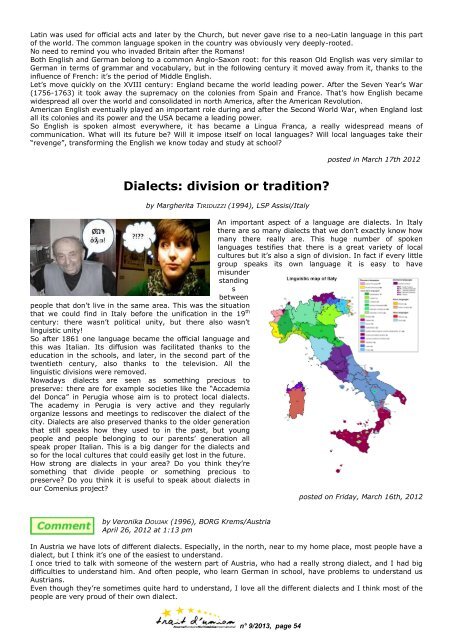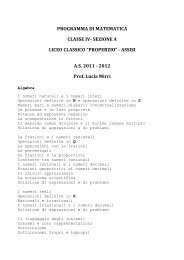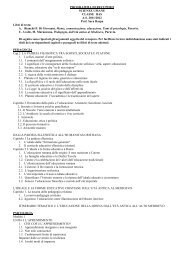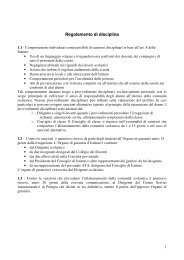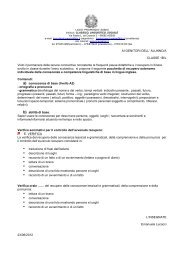The World is Changing - Liceo Sesto Properzio
The World is Changing - Liceo Sesto Properzio
The World is Changing - Liceo Sesto Properzio
Erfolgreiche ePaper selbst erstellen
Machen Sie aus Ihren PDF Publikationen ein blätterbares Flipbook mit unserer einzigartigen Google optimierten e-Paper Software.
Latin was used for official acts and later by the Church, but never gave r<strong>is</strong>e to a neo-Latin language in th<strong>is</strong> partof the world. <strong>The</strong> common language spoken in the country was obviously very deeply-rooted.No need to remind you who invaded Britain after the Romans!Both Engl<strong>is</strong>h and German belong to a common Anglo-Saxon root: for th<strong>is</strong> reason Old Engl<strong>is</strong>h was very similar toGerman in terms of grammar and vocabulary, but in the following century it moved away from it, thanks to theinfluence of French: it’s the period of Middle Engl<strong>is</strong>h.Let’s move quickly on the XVIII century: England became the world leading power. After the Seven Year’s War(1756-1763) it took away the supremacy on the colonies from Spain and France. That’s how Engl<strong>is</strong>h becamewidespread all over the world and consolidated in north America, after the American Revolution.American Engl<strong>is</strong>h eventually played an important role during and after the Second <strong>World</strong> War, when England lostall its colonies and its power and the USA became a leading power.So Engl<strong>is</strong>h <strong>is</strong> spoken almost everywhere, it has became a Lingua Franca, a really widespread means ofcommunication. What will its future be? Will it impose itself on local languages? Will local languages take their“revenge”, transforming the Engl<strong>is</strong>h we know today and study at school?posted in March 17th 2012Dialects: div<strong>is</strong>ion or tradition?by Margherita TIRIDUZZI (1994), LSP Ass<strong>is</strong>i/ItalyAn important aspect of a language are dialects. In Italythere are so many dialects that we don’t exactly know howmany there really are. Th<strong>is</strong> huge number of spokenlanguages testifies that there <strong>is</strong> a great variety of localcultures but it’s also a sign of div<strong>is</strong>ion. In fact if every littlegroup speaks its own language it <strong>is</strong> easy to havem<strong>is</strong>understandingsbetweenpeople that don’t live in the same area. Th<strong>is</strong> was the situationthat we could find in Italy before the unification in the 19 thcentury: there wasn’t political unity, but there also wasn’tlingu<strong>is</strong>tic unity!So after 1861 one language became the official language andth<strong>is</strong> was Italian. Its diffusion was facilitated thanks to theeducation in the schools, and later, in the second part of thetwentieth century, also thanks to the telev<strong>is</strong>ion. All thelingu<strong>is</strong>tic div<strong>is</strong>ions were removed.Nowadays dialects are seen as something precious topreserve: there are for example societies like the “Accademiadel Donca” in Perugia whose aim <strong>is</strong> to protect local dialects.<strong>The</strong> academy in Perugia <strong>is</strong> very active and they regularlyorganize lessons and meetings to red<strong>is</strong>cover the dialect of thecity. Dialects are also preserved thanks to the older generationthat still speaks how they used to in the past, but youngpeople and people belonging to our parents’ generation allspeak proper Italian. Th<strong>is</strong> <strong>is</strong> a big danger for the dialects andso for the local cultures that could easily get lost in the future.How strong are dialects in your area? Do you think they’resomething that divide people or something precious topreserve? Do you think it <strong>is</strong> useful to speak about dialects inour Comenius project?posted on Friday, March 16th, 2012by Veronika DOUJAK (1996), BORG Krems/AustriaApril 26, 2012 at 1:13 pmIn Austria we have lots of different dialects. Especially, in the north, near to my home place, most people have adialect, but I think it’s one of the easiest to understand.I once tried to talk with someone of the western part of Austria, who had a really strong dialect, and I had bigdifficulties to understand him. And often people, who learn German in school, have problems to understand usAustrians.Even though they’re sometimes quite hard to understand, I love all the different dialects and I think most of thepeople are very proud of their own dialect.n° 9/2013, page 54


